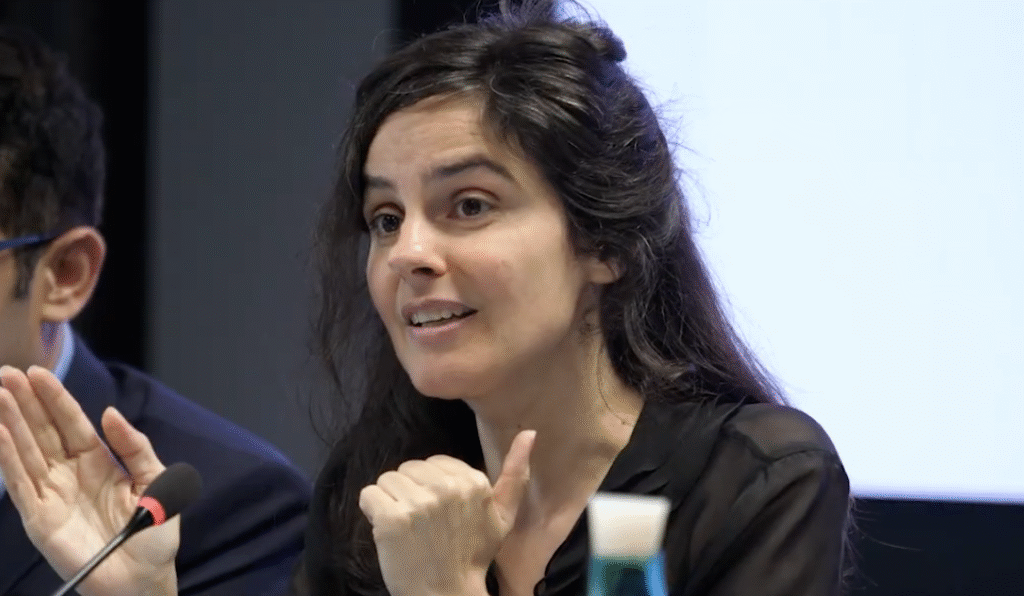Teresa Nobre outlines a chilling range of practices by publishers to try to restrict the ability of researchers to conduct computational research. From ‘choice of law’ clauses which seek to circumvent EU law, to increased liability and penalties on libraries which fail to police their users. Nobre suggests a series of urgent measures to tip the balance back in favour of libraries and their users, and ultimately in favour of the right to research.
This presentation was delivered at the User Rights meeting in Geneva on 17 June 2025. The full text is available below.
The transition to licensing
We have transitioned from a sales-based model in printed publications to a licence-based model in digital publications. What happens is that even if you have a fit-for-purpose framework that allows libraries to make certain uses of copyrighted works, they still need to rely on licences to have a first access to the material, and that gives publishers a lot of power in determining what libraries can and cannot do with the licensed materials, even if you have exceptions that allow them to make certain uses.
Communia’s research
We know that these licences tend to be subject to confidentiality agreements, which means that we don’t know what are the terms of these licences. Communia is a non-profit based in Brussels, we have been involved in copyright reform for many years, we have been coming to the SCCR for many years, and we decided in February this year, we invited licensing managers, so people that are from the library sector, public library and academic library sector in Europe, we invited them to come to Brussels and we held a Chatham House rules meeting. We also invited the European Commission to attend this meeting and observe this meeting.
And this environment where people could not attribute each other was the right environment for licensing managers to come and talk about the issues that they are facing with the licences, so the unfair licensing practices, the unfair terms that they are being subject to. So I will be mentioning some of those practices, and I will start with a very hot topic right now, which is the topic of AI, but also text and data mining for scientific research. Maybe I should also tell you that in addition to inviting librarians to come and talk to us in private, in front of the Commission, we also invited them to share with us in confidence clauses that they considered unfair, clauses that are part of those licensing agreements or licensing offers.
Efforts to Circumvent the European TDM Directive
Maybe here for those that are not European, I should give you a bit of a legal context of Europe. In Europe, six years ago we passed a new directive that guarantees that researchers in Europe can make text and data mining uses of copyrighted materials for scientific research. So we have a mandatory exception for these research uses. And this mandatory exception is protected against contractual overrides. And what does that mean? It means that if a licence says that you cannot make those uses, you don’t need to follow the licence because the law, the European law, protects you.
And what we realised, and we were very surprised, that publishers were actually concerned about prohibiting these uses in Europe when we have a law that allows these uses and prohibits contractual overrides. But that was indeed the case. So we noticed, and they told us, that since 2023, so place it at the same time where generative AI is raising, suddenly all the contracts are saying library users cannot conduct text and data mining on e-books and e-journals that are available in the libraries. They cannot conduct any related AI uses with those materials.
‘Choice of Law’ clauses
And surprisingly, what was interesting to see was that, well, they were actually concerned about putting those prohibitions in those contracts, although the law would not allow for those prohibitions, because they could circumvent the EU policy, the EU law, and our contractual overrides prohibition by selecting a law that’s outside of Europe. So we know that ‘choice of law’ is typically a clause that the parties need to negotiate and takes time to negotiate.
Everyone wants to choose their own law. But in this case, by choosing a law that’s not the national law where the library is located, meaning that’s not the EU law which would protect these uses against contractual overrides, they are able to circumvent basically the EU law and the prohibition of contractual overrides. And that’s enough.
So imagine all of the work that we have done throughout the years to have exceptions in place, exceptions that are protected against contractual overrides, is simply circumvented by a choice of law clause. I’m going to give you an example of what prohibition of AI uses in these licences means. And, you know, there’s different ones. And you can see in our report, we gave some examples of it.
Prohibition of AI-enabled browsers
But publishers go as far as prohibiting the use of browsers with connected AI functionality. People, nowadays, there’s no browsers that do not use AI. And publishers are prohibiting the library users from using browsers with AI functionality. This is how far it goes. We saw different variations of this.
For instance, you see one that’s very simple, straightforward. You cannot conduct text and data mining, which is exactly what the EU law allows you to do. And when it comes to the choice of law, I think typically what we are seeing is that they are choosing U.S. law, maybe because the U.S. law right now, it’s not very clear if it allows these sort of uses or not.
If it’s a UK publisher, they will select the U.K. law, which also doesn’t permit as many text and data mining uses as the EU law. So this is the first, let me say, the first category of obstacles and really damaging for research and science, obstacles that we have noticed in our licences. Then we also realised that suddenly these prohibitions were being paired with new standards for liabilities.
New Liabilities for Libraries
Up until now, every licence to the library sector required libraries to implement certain measures to ensure that there was no licence infringement. And these kind of measures would be, you know, ensure that the user is authenticated or ensure that the user knows the terms of the licences. And provided that the library did this, the library would never be liable for any licence infringement.
That was the responsibility of the library user, the patron that is using the material. And suddenly, since last year, all the licensing offers that libraries in Europe are receiving have these new standards of liability that simply say that library is fully liable for the actions of the users. This mostly connected with the prohibitions of AI.
Chilling Effect of New Liability Standards
So if the user does text and data mining, wants to use an AI automated application, etc., the library is automatically liable for that. And that, of course, was, I think, the no-go for most libraries in Europe. They are really scared about these new liability standards, and so much so that some are saying, you know, after one year unable to reach an agreement in terms of liability, they are simply saying we are not moving forward with the licence.
And with big publishers that are really important for the scientific sector, and we have an example from a Finnish consortium, they were negotiating for one year with the American Chemical Society, which is a very important publisher in the sector. They’ve been having for 25 years licences with this publisher, and they said, and they publicised this, due to fundamental differences of views on liability issues, we are no longer signing an agreement with this publisher. And on top of that, you know, you have strong penalties for noncompliance. And I can give you an example of that.
I should give you that context, in Europe, we have these consortia of libraries that negotiate licences on behalf of the individual library. So when you see here the consortium member is the library, so the licensee, maybe held liable for noncompliance by authorised and working users.
This is insane. Insane. It’s impossible for a library to work with this framework.
Penalties Imposed for Infringement
And then with penalties. So if you infringe, and we decide this at our sole discretion, if you have infringed or not, immediate termination of the agreement without any refunding, denial of existing or any future access, civil, criminal penalties. I mean, any librarian that looks at this, they will just be so scared of doing anything, of allowing anyone to access the materials, that this is impossible.
And that tells us a lot about what the framework needs to do in terms of rebalancing the power in negotiations of licences.
Refusing to Deal with Libraries or Restricted Licensing
Then finally, one last category, before I move into what are the solutions, one last category of practices, and I think this one has been well documented. We know that libraries, many publishers, not many, but some, and important ones, refuse to deal with licences, with libraries.
So they refuse to licence digital materials to libraries. Others do not refuse, but the licensing models are extremely disadvantaged to libraries. You know, from bundling licensing, I guess it’s one of those more perversive licensing models that are really disadvantaged to libraries because they don’t get to choose which titles do they licence.
They are only offered this package of titles. They don’t know which titles are in the bundle, and even if they only need two or three of those titles, that’s the only thing on offer. You either buy this or you don’t buy anything because we don’t license one by one of the titles.
And then worse than that, they withdraw whenever they want the titles from the bundle. So for instance, if the book that’s in the bundle won a prize, or if it was selected for the course, they will immediately go and take out the title from the bundle. And it’s insane.
Solutions
So what do we need to do to solve this solution? And of course, I think these are objectives and principles that can serve the WIPO work. This is really important to think also at the EU level, I guess any level, regional level, national level, local level. So I will not talk about each of those objectives and principles because I know there are other speakers that are focusing on that.
- But first of all, of course, we need to ensure that contracts do not prevent the enjoyment of exceptions. That’s what we normally call prohibition of contractual overrides. And Jonathan Band will talk more about that later.
- Then we need to ensure that those choice of law provisions do not affect the enjoyment of the exceptions again. So it’s another way of preventing contracts from limiting the scope of protection of the exceptions. And in this case, I guess what a simple way of saying this is that exceptions should be applicable irrespective of the law, otherwise applicable to the licence.
So there’s many ways of doing this. You can treat exceptions as overriding what we in Europe called overriding mandatory provisions. You could, for instance, create a new category of vulnerable parties. So treat libraries as consumers. And I know that Stephen Wyber will talk about this in this panel. So you could give member states the option to find the right private international law mechanisms, more or less intrusive, but do ensure that the choice of law will not limit the exceptions.
- Then, of course, if libraries are now being subject to these licences that require them to be fully liable, I think we need a legal intervention as well to limit the legal exposure of knowledge institutions to liability. And I know our colleague Casper in the afternoon will talk about that.
- Then, of course, you might need to think about an obligation to licence where the publisher already markets those words, then he should not be able to refuse to licence. And I know my colleague Justin will talk about that in the afternoon. Finally, even if you do not require publishers to licence to institutions, you certainly can do something else or in parallel or in alternative, you can require publishers, if they do licence to libraries, they must offer conditions that are fair and reasonable. And you can say that these conditions must be adequate to the needs and specificities of institutions.
So it would be an elegant way without saying that they need to offer fair and reasonable terms.
And you can do much more, but I think this would be kind of the bare minimum from our perspective coming from these practises that I just mentioned that are happening right now and are really damaging to the library sector and I imagine for other sectors as well and very important for education that depend on libraries, very important for research that depend on libraries and the licences that they have to access those materials.
Thank you.
Note: there may be some inaccuracies in this transcript due to the use of automated transcription tools. A video version is available here.










